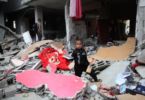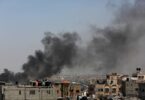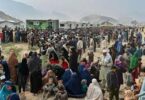The effects of a potential war between Iran and Israel would likely have significant repercussions on the broader world stage. Here are some potential impacts:
- Regional Destabilization: An Iran-Israel conflict could escalate tensions across the Middle East, leading to increased instability in the region. This could potentially draw in other countries and non-state actors, further exacerbating conflicts in Syria, Lebanon, Iraq, and beyond.
- Oil Prices and Global Economy: The Middle East is a major hub for oil production. Any conflict in this region could disrupt oil supplies and lead to a spike in global oil prices. This would impact economies worldwide, potentially causing economic downturns and affecting various industries reliant on stable energy prices.
- International Alliances and Diplomacy: A conflict involving Iran and Israel would likely prompt international responses and alliances. Countries may be forced to choose sides or get involved diplomatically, leading to complex political maneuvering and potentially strained relations between different nations.
- Humanitarian Crisis: Wars in the Middle East often result in humanitarian crises with large numbers of refugees fleeing conflict zones. This could place additional strain on neighboring countries and international aid efforts.
- Global Security and Terrorism: A heightened conflict could increase the risk of terrorist activities globally, as extremist groups may exploit the chaos and violence to further their agendas.
- Nuclear Concerns: Iran’s nuclear program is a significant international issue. A war could impact efforts to manage or control this program, potentially leading to broader proliferation concerns.
- Impact on Global Stability and Trade: Geopolitical tensions can impact global stability and trade flows. Uncertainty and conflict can undermine investor confidence and disrupt supply chains, affecting global markets.
Overall, the effects of an Iran-Israel war would likely be far-reaching and complex, impacting political, economic, and security dynamics around the world. Efforts to prevent such a conflict and to find diplomatic solutions remain crucial for maintaining global stability and security.
The effects of an Iran-Israel war on Pakistan could be significant, given Pakistan’s geopolitical position and regional relationships.
Pakistan shares a border with Iran and has historical ties with both Iran and Israel. A conflict between these two countries could lead to heightened security concerns for Pakistan. There could be implications for border security, refugee flows, and potential spillover effects of violence into Pakistan’s territory.
Pakistan may face diplomatic pressures to align with either Iran or Israel or to take a neutral stance. This could strain Pakistan’s foreign relations and impact its strategic partnerships in the region and beyond.
Pakistan’s economy could be affected by disruptions in trade routes and energy supplies resulting from a regional conflict. Pakistan heavily relies on imports of oil and gas, and any disruption in the region could lead to increased prices and economic challenges.
A conflict in the neighboring region could have implications for Pakistan’s internal stability. It could exacerbate existing tensions or fuel sectarian or extremist sentiments within the country.
In the event of a conflict, Pakistan could see an influx of refugees from Iran or other neighboring countries affected by the war. This could strain resources and create humanitarian challenges.
Pakistan’s foreign policy decisions in response to an Iran-Israel conflict could impact its relations with other global powers, particularly the United States, China, and Gulf countries, which have their own interests and alliances in the region.
Overall, while the specific impacts would depend on the nature and scale of the conflict, Pakistan would likely be influenced by regional dynamics and would need to carefully navigate its response to ensure its own security and stability amidst heightened tensions in the broader Middle East.







